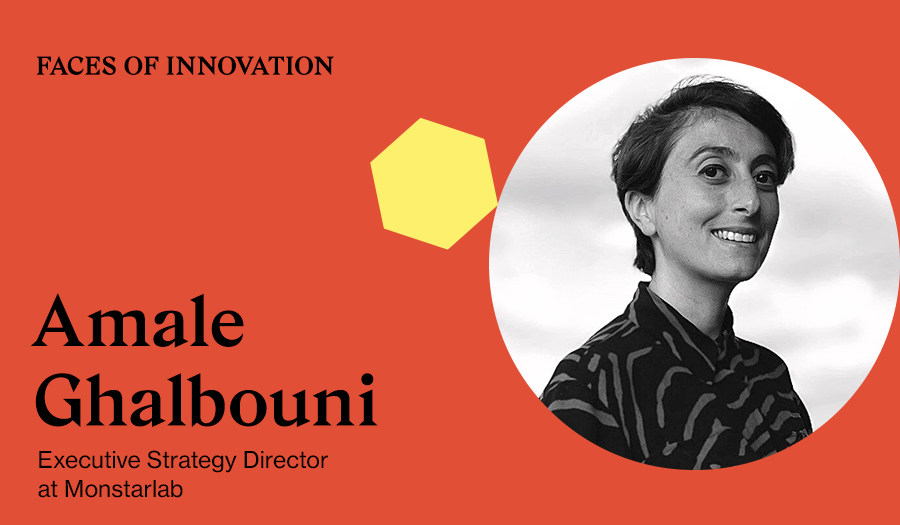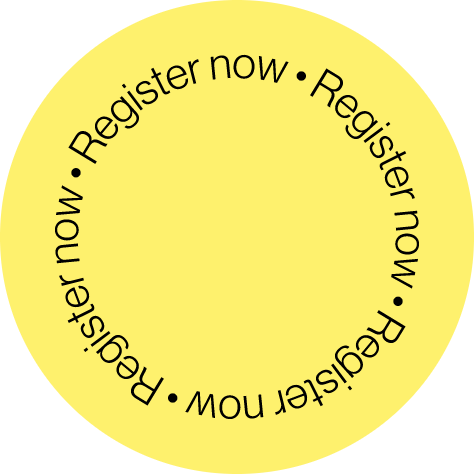-960x530-4-1.png)
Monstarlab is home to about 1,400 strategists, designers, and technologists who work on diverse briefs across the finance, insurance, healthcare, retail, and automotive sectors.
Amale leads the strategy and experience team at Monstarlab in the UK. “We're at the forefront of the process. We help identify the right opportunity and validate it through research, insights, workshops, and collaboration. We take the process all the way up to identifying a product, designing it, and making sure that it's ready to launch,” Amale explains.
We were curious how Amale landed at Monstarlab. “Like many others, I took a very winding road to end up where I am today,” Amale said.
She started out in strategy consulting as a freelancer, working with brands across media and banking to help them understand and refine their strategic vision for the next three to five years. “I realized that it wasn't effective, because my recommendation was always for how to transform your business. But my job was not to actually do the transformation,” Amale explains.
So Amale transitioned from strategy consulting to “true innovation,” what she refers to as the exact and opposite end of the spectrum. “We take an idea from concept to a validated working prototype in anything from a few weeks to a few months,” Amale said. She tells us she appreciates the creativity, collaboration, forward-thinking, and diversity of work in this space.
From a “Hunch” to a Revolutionary Sales Tool for Women
“The briefs that get me really excited are genuine transformation briefs,” Amale said. She recalls a recent project with Avon Products, a multinational personal care company, to redesign the company’s business model. Avon is predicated on individuals selling the brand; for 135 years, the company has provided women a chance to earn an independent income. In total, the direct selling industry is 75% women; direct selling generated over $40 billion in retail sales in the US in 2020.
“Previously, the sales process for the representatives at Avon was done primarily offline and in a very analog fashion,” Amale said. Monstarlab entered the project with a belief they could create a platform for reps to better represent themselves and their business. The result was the Avon On app.
-960x530-4-1.png)
“We digitized the whole business,” Amale said. “It was quite transformative, not just as a tool, but as a way of doing business and empowering women across the world to be more efficient, realize more sales, grow their business, and become more independent.”
“It's a very cool piece of work that started with a hunch and ended up being fairly revolutionary in the way it enabled people globally to do their work,” Amale said.
Cosmetics Business wrote that the digital platform helps Avon move away from its traditional, door-to-door or “Ding Dong” selling, especially now that online sales are nearly three times higher than pre-pandemic levels.
A Customer Experience Lesson: Be Careful What You Digitize
While Avon On was indeed revolutionary, Amale is quick to offer a warning: “Just be careful what you digitize,” something that a lot of organizations get wrong when it comes to customer experience.
“Some clients think the answer is always digital, without considering the customer’s need at a specific point in time,” Amale said.
Digital is a tool, it's an enabler, it's there to help deliver the experience, but it's not the be all and end all. We've seen in the pandemic—even as customers ourselves—that sometimes you interact with brands digitally, and you get nowhere because it's not the best channel to communicate.
Amale’s second lesson is all about the internal customer: the employee. Too often, she witnesses a company focusing on customer experience to the detriment of the employee experience. For example, a healthcare company might seek to improve its patient experience, be it a web, app, search, or in-clinic experience. “But they're not thinking about what the clinician’s experience is, what tools they need to be able to do the job, to be able to communicate the right information at the right time to the customers,” Amale said.
The same is true in retail. “You can design whatever experience you want. It can be best in class. It can be cutting edge. It can be completely differentiated from your competitors,” Amale said. “But if your retail assistant cannot deliver or doesn’t have the tools, data, capability, and training to deliver this beautiful experience that you designed in isolation, then you're going to fail.”
What can Boiler Repair Teach us About Human-First Design?
As a strategist, we imagine that Amale never expected to learn the craft of boiler repair. In a previous life, she worked with a home insurance and home repair company. “Their brief was: Make us digital. I will pause because that was a huge brief. Really, where do you start? How do you make a global company digital overnight? Genuinely, where do you start,” she laughed.
Drawing from her own lesson to not neglect the employee experience when it comes to digital transformation, Amale and her team rolled up their sleeves and spent a day in Queens, New York with an engineer, actually fixing people’s boilers.
“It was a lot of fun, because you get to see firsthand what the company does and that's the bit I enjoyed the most. It takes strategy out of the boardroom and onto the streets, it brings it to life,” Amale said. “It ensures that whatever we're designing is human-first, that it’s going to work for people who work at the company.” She also spent time with call centers in the UK, France, and US, listening to calls from people with home repair emergencies.
“It was incredibly eye-opening for the business. We took back fascinating stories of customers who were really happy … but we also had some horror stories that our executives had never heard,” Amale said. “It was a shock to their system to hear about a 90-year-old waiting from 8 AM to 6 PM for somebody to come and fix her boiler two days in a row. It genuinely made them realize that you can't fully digitize this.”
I feel that humanization of what a business does is so important because quite often, the problem with strategy or abstract decisions that get made by the direction of the company are made in closed rooms with no insights into how things work in practice, how things are felt by people in the real world.
So when another of Monstarlab’s clients, Shake Shack, sought help to redesign its in-store experience and create a kiosk to speed up the ordering process, Monstarlab got to work literally flipping burgers at a few restaurant locations.
“We need to understand what it feels like to order food from you, but also what it feels like to serve food in your restaurants,” Amale said. It proved to be an invaluable experience. The first tool the team designed was “too good”, Amale explains. It created too many orders and the kitchen wasn’t able to keep up. Monstarlab backed this discovery up with analytics and data and tweaked the product to ensure it delivered on client expectations but in a way that was manageable for the restaurant employees.
-960x530-4-1.png)
I think that aspect of making sure technology works for people sometimes gets forgotten. Something that, on paper, looks great, but it's not rooted in genuine empathy, genuine understanding of how things work.
-Amale Ghalbouni
Attracting and Retaining the Top “Monstars”
“One of our values at Monstarlab is to do the right thing,” Amale said. “Quite often we get asked silly things and we really try to talk sense into clients by going, we don't think that is the most important thing for you to do right now. Or that's not the best thing for you to spend your money on,” Amale said. The core essence of the consultancy is its global cadre of “Monstars”, the ambitious strategists, designers, and digital engineers that work in 30 offices in nearly 20 countries.
For Amale, a positive outcome of the pandemic has been the opportunity it provided people to think about what really matters to them. “Before the pandemic, no one I knew blinked about commuting two hours a day,” Amale said. But, with everyone stuck at home, people had time to pursue other things (think pottery or woodworking or watercolors).
“Now, a lot of people are just voting for their preferences in terms of employment. They’re saying, I'm ready to walk away from you, employer, because you do not value the same things I value. Being genuinely aligned in terms of principles and values, in terms of authenticity and purpose with your employees is really important,” Amale said.
Attraction is easy for employers, Amale tells us. Retention will be the challenge in the year ahead. “When you join, when you get a feel for the culture, you want to make sure that whatever you sold employees at the recruitment stage is what you genuinely believe and what you genuinely practice. Because retention, I feel, is going to be the biggest challenge for most employers in the next 12 months,” Amale predicts.
I think there's going to be a lot more churn in terms of people leaving because their values don't align with their employers’, or they don't feel like they're being trusted enough to do their job, that they're not being empowered, that they're not being listened to.
Amale's advice to employers is to listen—genuinely listen—because there's a lot more power for employees right now, as there should be.
Advice for Job-Seekers: Ask a Lot of Questions
“The most important thing is to find a place that values what you can bring to the table, including your ambitions. Quite often I meet people who think they're looking for a job where they can deploy the skills they already have, but they don't really think about what they want to learn from an employer,” Amale said.
She advises people to have a list of things they want to be exposed to, things they want to learn with an agency or consultancy. But, remember that it’s a two-way street. Employers also need to think about attracting talent who are eager to learn and grow with the team.
My advice is to be upfront about what you want from your employer, not just in terms of package, compensation, and title, but in terms of what you want to do on a day-to-day basis. Find a place where you're going to be challenged, where you're going to be encouraged to grow, where you're going to be exposed to things that are going to help you develop.
The interview process is a key opportunity to see if a consultancy or agency is a good fit, on both sides of the table. Her final piece of advice for the interviewee? “Ask questions. Loads.”
Could you be the next Monstar? Are you eager to roll your sleeves up and take strategy from the boardroom to the street? Be sure to contact Drew Welton to hear more about open roles at Monstarlab, and register with Bamboo Crowd today for other opportunities and insights.



